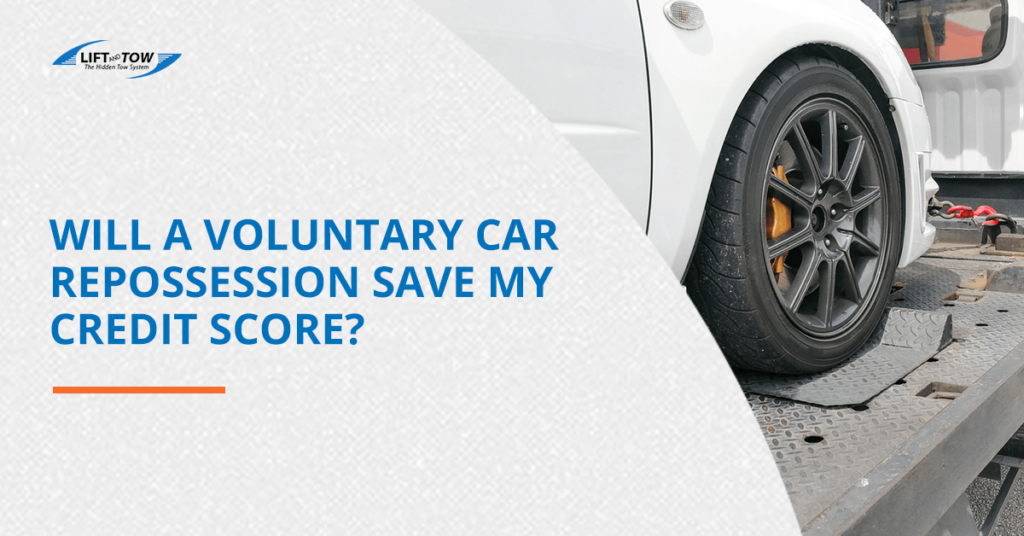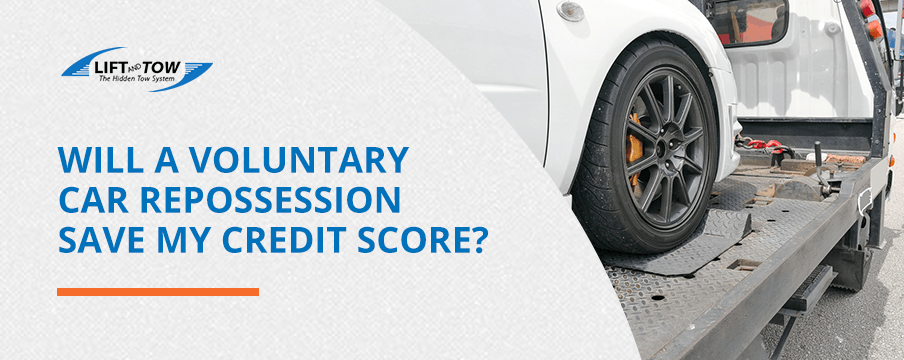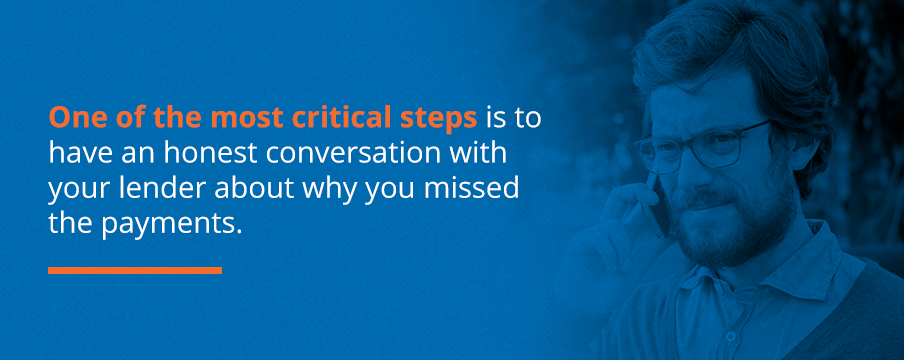
Understanding the Impact of Voluntary Car Repossession on Your Credit Score
Whether you miss one or several payments on your car loan, the situation shouldn’t be taken lightly. You must act fast and make smart, honest decisions based on your finances and circumstances. In many cases, failing to pay consecutive installments can result in repossession of your vehicle, but you can take several proactive steps to avoid it.
Lift and Tow will help you understand the impact of voluntary repossession and how voluntary repossession works.
Table of Contents
- How a Repossession Affects Credit Scores
- What Is Voluntary Repossession?
- Should I Voluntarily Repossess My Vehicle?
- How to Avoid Repossession
How a Repossession Affects Credit Scores
Vehicle repossessions can affect your credit score if you have any of the following:
- Late loan payments: Always make a valid effort to follow through with monthly payments for a vehicle loan. Even forgetting to process a single payment can negatively impact your financial situation and increase the likelihood of your lender reaching out for more information.
- Repossessions: Your lender has the right to ask about missed payments. Ignoring calls or letters in the mail may result in the lender hiring a repo company to recover your car or truck.
- Collections: Any funds owed to a lender or repossession company must be paid in full. You’ll soon receive phone calls, letters or news of a lawsuit coming from affected parties should you fail to hold up your end of an agreement.
- Court judgments: Lenders often take borrowers to court when the terms of a loan are broken. This could result in parties having additional leverage over you to collect the funds that belong to them.
Each can appear on your report as a separate entry. Repossessions, collections and court judgments can remain on your credit report for up to seven years, reading as a derogatory mark and dropping your credit score by 100 points.
Repos can also affect your ability to get a vehicle loan in the future since the repo is on your credit report. A lender may charge higher interest rates if approved because of the risk. On top of your credit score, repos affect your bank account. Even after your car is taken and sold, you often need to pay the difference, a deficiency balance.
Your credit undergoes devastating, long-term effects when your car is repossessed. Both voluntary and involuntary car repossessions can affect a cosigner’s credit because each person shares the responsibility. However, a cosigner benefits from the same rights as the primary borrower if a repossession occurs.
How Long Does a Repo Stay on Your Credit?
A repossession can remain on your credit report for up to seven years from the date of the repossession.
How to Get Repo Fees Waived
Explore the following to sidestep unwanted repo fees:
-
Negotiate with the Lender
-
Provide Evidence of Hardship
-
Request a Payment Plan
-
Consult Legal Advice
-
Check for Errors
What Is Voluntary Automobile Repossession?
Also called a voluntary surrender, a voluntary car repo happens when you can’t afford your car payments and return your vehicle to the lender on your own terms. Many believe this is the safe way out, but it isn’t always easier or less painful than going through an involuntary repo.
Steps on how a voluntary repo works:
- Call the lender and explain the situation: Lenders are mostly concerned with receiving your payments and sticking to the terms of your agreement. You’ll need to let the individual or organization know you are thinking of voluntarily giving up your vehicle, instead of waiting for one or more missed payments to happen.
- Set up a time and location to return your car: Your lender may have a tight schedule. Following through with a voluntary repo requires you to agree to a time and place to hand over your car, truck or SUV. Be sure to arrive on time and bring all sets of keys and items included with your vehicle, such as interior mats.
- Record the date, time and personnel information: You’ll sign paperwork verifying you are giving your vehicle back to the lender for future sale. Selling your vehicle can take a few hours or weeks, based on demand.
- Cover the deficiency balance post-sale: There’s a chance the sale price for the vehicle is less than the remaining balance of your car loan. The original lender will turn to you to cover the difference in price.
A voluntary repo is more immediate than an involuntary one. Involuntary is when a lender takes action to seize your vehicle when a loan is defaulted.
How Long Does a Voluntary Surrender Stay on Your Credit?
A voluntary repossession stays on your credit report for up to seven years from the date of the first missed payment. Regardless of the fact that you are being proactive with the repossession process and saving parties a trip out to retrieve your automobile, voluntary surrenders are treated identically to involuntary repos.
Should I Voluntarily Repossess My Vehicle?
There are many pros and cons of voluntary repossession, but whether you choose to proceed with the process or rely on involuntary repossession, your credit score will still be affected.
Advantages
Here are some of the benefits of voluntarily surrendering your car:
- Avoid stress and the emotional aspects of an involuntary repo
- Take your car in during a time that suits you
- More convenient and doesn’t have to happen in front of others
- Stop your car payments
Disadvantages
However, volunteer repossession is still repossession and comes with significant drawbacks.
- You still need to pay the deficiency balance after a lender sells your car and applies the proceeds to your loan.
- It still affects your credit score and shows up on your history.
- It gets reported by your lender to credit bureaus.
- It has the same amount of damage as an involuntary option.
- You are responsible for repo fees.
- The account turns over to a collection agency if you can’t pay.
- A lender can take you to court.
Only rely on a voluntary repo as a last resort when you’re out of options and negotiations. It’s only a slightly better option than involuntary.

How to Avoid Repossession
You can handle missed payments correctly instead of giving up and turning in your car. One of the most critical steps is honestly talking with your lender about why you missed the payments. If they’re willing to work with you, you can determine an ideal solution for you both. It’s better to prevent a repo and pursue alternatives to help limit the damage to your credit score.
1. Know How Much You Owe
If you can cover your missed initial payment, pay it off immediately. But if you’re tight on finances, start by understanding your loan balance, term and interest rate. Is there a late fee?
Review your budget to see if you can pull money from other expenses or eliminate some. Implementing the 50/30/20 budget is a good place to start if you don’t already have a budget in place. Step one is determining whether your missed payment is a one-time occurrence or if it will be an ongoing issue.
2. Recognize Your Options
It’s vital to be honest with yourself and your lender. Was the missed payment a one-off mistake, or is it a sign you can’t afford your loan? If you can meet the expense of your missed and current payments, you may have to pay a late fee immediately. Sometimes, lenders may waive late charges if you have open communication. You can also inquire about automatic payments to help you avoid missed expenses.
Loan deferment is common if you can’t afford a single car payment. It’s when the lender pushes a missed payment to the end of your loan term. You have to pay off the interest owed for that month.
When you can’t afford the loan, you need to seek a deferment for the remainder of the month to stop the threat of damage to your credit score. It would help if you looked into long-term solutions, such as refinancing the loan, trading your car for a more affordable vehicle, picking up a part-time job or selling your car.
Consider selling your vehicle, especially if it’s worth more than your current loan balance. Next time, you can invest in a used car that’s an older make and model, so you don’t have to borrow money from the bank. You can also use other forms of transportation like buses, trains and taxis.
3. Call Your Lender
Call your lender after you figure out what you owe and your options. Ask about solutions like deferment and other suggestions they may have. Remember to be kind because you’re asking for a favor. Explain what you’re willing to do to make up for the missed payment.
Honesty is key because you will often have to prove your story. Lenders would rather spend the time helping you than spend money repossessing your car. During the conversation, you may be able to negotiate an extension, enter into a deferment or receive a revised payment schedule.
Communication is critical when you’re seeking support from your lender. Don’t ignore their calls and letters. Instead, confirm your options and reach out to them for assistance. You can save your credit by avoiding repossession. If you find yourself in a situation where repossession is unavoidable, it’s essential to know your options. For guidance on the steps to take after a repossession occurs, check out our article on what to do if your car gets repossessed.
Learn About Our Towing Equipment
Sidestepping repossession can save you from incurring dings in your credit score. If you take the proper steps, you can avoid voluntary and involuntary repossession. Lift and Tow is the creator of the hidden wheel lift that attaches to the underbody of your pickup. Our solutions convert your vehicle into a tow truck and can remain hidden when not in use. We engineered an economical alternative to investing in a tow truck to reduce manual labor and deliver efficient loading.
We deliver value to your operations while giving you a competitive advantage in the industry. Discover what products we offer or contact us online.
